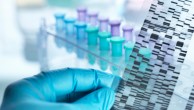Most Americans Accept Genetic Engineering of Animals That Benefits Human Health, but Many Oppose Other Uses
Americans' concerns about animal biotechnology focus on risks to animals, humans and the ecosystem.
Americans' concerns about animal biotechnology focus on risks to animals, humans and the ecosystem.
About half of Americans believe that within the next 50 years science will find a way to eliminate virtually all birth defects through gene editing. Yet majorities of Americans harbor at least some reservations about the impact on society of more widespread use of gene editing.
Americans are more likely to anticipate negative than positive effects from widespread use of gene-editing technology
Forty years after the birth of the first baby conceived via in vitro fertilization, 33% of Americans say they or someone they know has undergone fertility treatment.
Many Americans say government investments in medical research, engineering and technology or basic scientific research usually pay off in the long run.
Most Americans are confident that private space companies will make meaningful contributions in developing safe and reliable spacecraft or conducting research to expand space knowledge.
About four-in-ten Americans (42%) say they would definitely or probably be interested in orbiting the Earth in a spacecraft in the future, while roughly six-in-ten (58%) say they would not be interested.
Despite the increasing role of private companies in space exploration, most believe NASA’s role is still vital for future
Sixty years after the founding of the National Aeronautics and Space Administration (NASA), most Americans believe the United States should be at the forefront of global leadership in space exploration. Majorities say the International Space Station has been a good investment for the country and that, on balance, NASA is still vital to the future […]
The U.S. public’s concerns about drug addiction come amid increases in the number and rate of fatal drug overdoses across urban, suburban and rural communities.







